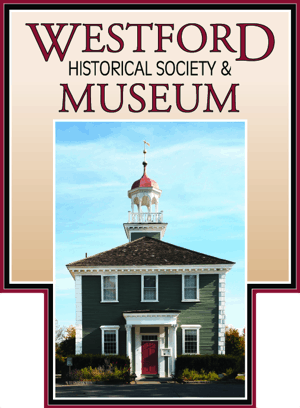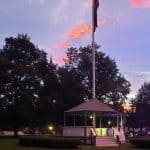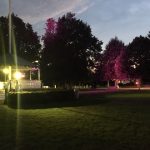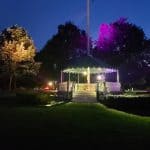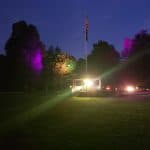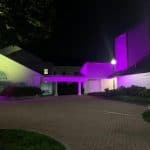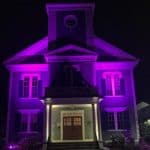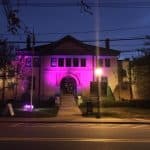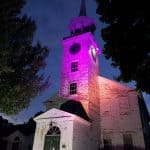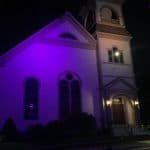The Speeches
Order of Speakers
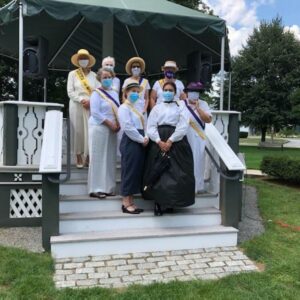
Back Row:Ellen Harde, Madonna McKenzie, Andrea Peraner-Sweet, Laura Dickey
Linda Greene (Opening remarks)
Suffragists
- Kate Hamlin (Jazmin Rodriguez)
- May Balch (Olivia Dunn)
Select Board Members
- Ellen Harde (1972)
- Madonna McKenzie (1992)
- Andrea Peraner-Sweet (2010)
Laura Dickey (LWV of Westford)
Emily Teller: Forward into the Light” the lighting of the Westford Common
Anita Tonakarn-Nguyen: The reading of the 19th Amendment
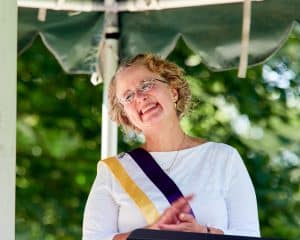
Hello, my name is Linda Greene, I’m the Director of the Westford Museum and I’d like to welcome you here this afternoon to our Westford Celebrates Women’s Right to Vote Victory Rally and Promenade
This year 2020 marks the 100th anniversary of the passage of the 19th Amendment, guaranteeing and protecting women’s constitutional right to vote.The Westford Historical Society in collaboration with the League of Women Voters of Westford and the Westford Cultural Council, has been working to ensure, that this anniversary, and the 72-year fight to achieve it, is commemorated and celebrated throughout Westford.
The women’s suffrage movement was a long fight to win the right to vote for women in the United States. It took activists and reformers nearly 100 years to win that right, and the campaign was not easy: Disagreements over strategy threatened to cripple the movement more than once. But on August 18, 1920, the 19th Amendment to the Constitution was finally ratified, enfranchising all American women and declaring for the first time that they, like men, deserve all the rights and responsibilities of citizenship..
In Westford on Aug. 28, 1920, just two days after the certification of 19th Amendment 121 Westford women registered to vote. In total, 279 Westford women registered to vote before the November 1920 Presidential election and for 100 years the women of Westford have taken their responsibility very seriously by making their vote and their voices heard.
This afternoon we are going to hear from Westford Women then and now. We will hear the remembrances of Kate Hamlin and May Balch and how the Suffrage Movement affected their lives when they were living here in Westford in the early 1900’s. To the Westford women that have influenced and shaped Westford into the town that we all love today.
It gives me great pleasure to introduce to you, Kate Hamiln, portrayed by Jazmin Rodriguez.
Jazmin Rodriguez is a senior at Westford Academy. She’s a member of the WA Museum Club, the color guard, and was named the Most Worthy Representative of the Freshman Class of 2021. As an Anti-Defamation League Student Representative, last year she and 27 other WA students led 5th grade diversity and inclusion focus groups. She is also a member of the Stormgear’s and was on their first robotic team and if Kate Hamlin was here today, she would be very impressed with all you have accomplished.
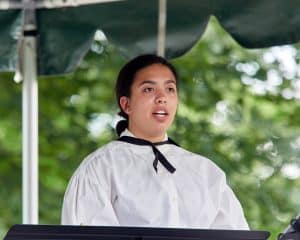
My name is Kate Hamlin, a native of Westford. My family lives right there, in the house known to all as the Fletcher Tavern.
Today I wish to speak to you about my involvement working for Women’s Rights. When I became a student at the Westford academy in 1861, I was proud that from its founding in 1792 the academy admitted women. In 1871, my older sister Sara, also a graduate of Westford academy, was among the first women accepted to attend the University of Michigan, one of the first of the men’s colleges to say to women, “Well, come in, if you insist.”
“It was immediately after the Civil War that the question of “Women’s Rights” was constantly brought up. When agitation was at its height, one day in 1868 I attended a Woman’s suffrage meeting in Boston. I was twenty-one, and on the platform sat Julia Ward Howe, Susan B. Anthony and many other women, all earnest workers for the cause.”
It was a long fight. Not until half-a-century later, in 1915, did the question finally appear on the ballot to amend the Massachusetts constitution to allow women to vote in this state. That summer of 1915 “an open-air meeting was held in the interest of equal suffrage on Wednesday evening August 21st here at Westford common. The speakers were Teresa A. Crowley and Gertrude Halladay Leonard, both good speakers, who presented their cause to a good number of listeners.”
That November of 1915, 165 of the 349 men who voted in Westford voted Yes on the question to allow women to vote in Massachusetts – forty-seven percent. In the Forge Village Precinct 4 the question indeed passed by a vote of 29 to 28.
And here we are in 1920. I am now 73 years old and finally Congress has passed and three-fourths of the states have ratified the Nineteenth Amendment to the Constitution allowing women to vote in our nation. Again we meet on Westford common.
What an accomplishment for the suffragists! Proudly we can tell our granddaughters and great granddaughters a century from now in 2020 how Westford rallied behind the Nineteenth Amendment.
Thank you.
(*Kate Hamlin’s speech was research and written by Ellen Harde)
Olivia Dunn is a senior at Westford Academy. She’s a member of the WA Museum Club and won an excellence in acting award for her role as “#11” in the Westford Academy Theater Arts production of “The Wolves,” which won the state finals in April 2019. She’s a member of the Westford Academy Girl Soccer Team and is active with the Westford Teen Arts Council.
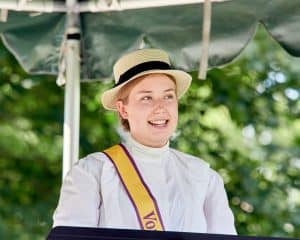
I am Mary Balch, known to most of you as May, and I grew up in Westford, first in Parker Village then on Boston Road.
When I began my education at the Westford academy in 1888, women were already demanding “equal rights.” In 1915, I believed it was time for universal suffrage.
My feeling about women being given the vote was strong enough that on October 16, 1915 I was proud to represent Westford in the suffrage parade in Boston. Our rally in Boston was in support of the ballot measure on the November 1915 ballot to amend the Massachusetts Constitution to allow women to vote in all elections. The Massachusetts Legislature had given women the right to vote for School Committee twenty years earlier, but we could not yet vote for our Selectmen or vote at the Annual Town Meeting.
It took an amendment to the Constitution at the national level to accomplish what women have been fighting for. And here we are gathered today to celebrate the recent ratification of the 19th Amendment and to honor the seventy-three years of work by the suffragists.
I am also here to celebrate the defining moment that Saturday afternoon following ratification when I was one of one hundred and thirty-nine Westford women who registered to vote at the Westford Town Hall. As Sam Taylor wrote in the Westford Wardsman the following week, “This shows the interest of women in their new responsibilities. “
Indeed it does!
(*May Balch’s speech was research and written by Ellen Harde)
Ellen Harde was the first woman elected to the Westford Board of Selectmen (serving from 1972 until 1974) and the first woman Moderator of the Westford town meeting (serving for 25 years from 1993-2017). Among her many other roles serving the town, she helped found the Roudenbush Community Center, was instrumental in launching the town’s recycling program, and spearheaded the Common restoration project, including the building of the delightful bandstand that we’re enjoying today. A member of the Westford League of Women Voters since its founding over 50 years ago, Ellen also wrote the League’s slide-tape history, “Westford: A Sense of Community,” along with other histories of the town. She has been a long-time member of the Recycling Commission and currently chairs the 35 Town Farm Road Task Force. On Wednesdays, she is behind the counter at Muffins on Main.
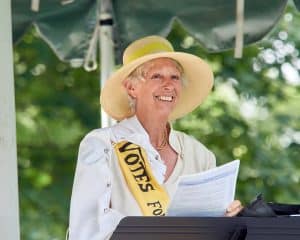
The ratification of the 19th Amendment In August of 1920 meant that women in Westford could run for any town office – not just for School Committee and Library trustee. But it took more than half a century, until 1972, for a woman to file nomination papers to run for Selectmen. In 1972 two women ran, Evelyn Chorney from Parker Village and myself. And six men. There were two seats open that year because Town Meeting had voted to enlarge the board from three to five Selectmen. To everyone’s astonishment, I was elected, coming in second in the field of eight, just 25 votes ahead of the third runner up. There was astonishment because I had moved to Westford just five years earlier and thus was a blow-in, always will be, and I was two days shy of my twenty-seventh birthday.
I did not run to prove that a woman could be a Selectman. As Colorado Congresswoman Pat Schroeder said during her bid for the Presidency in 1988 when people asked her if she was running as a woman, “What choice do I have?” I ran because I was six years out of college with a degree in government and there were concepts I had learned that I believed could be applied to town government. For almost three years I had attended every Selectmen’s meeting as a member of the League of Women Voters of Westford Observer Corps, watching and learning.
My goal? To get the word out, to educate the voters of Westford about the issues that were coming before the Selectmen. No agendas were published ahead of the meetings. There was not yet a Westford Eagle. There were only the League Observer Corps notes in the monthly League bulletin and the coverage by Lowell Sun reporter Irene Woznac of Graniteville.
The four other Selectmen did not have the same goal that I did and they did not support me. Not out of meanness. They just did not see the role of Selectman as I saw it. They were very comfortable with their status quo which was few residents at the meetings and little discussion.
It was hard. As a result, I did not complete my three-year term. But when I resigned from the Board of Selectmen in 1974, I did not resign from my commitment to make town government work. For I had learned that being on the board was not a requirement for bringing about changes. Bringing about changes requires only a personal vision and perseverance, and the ability to bring voters at town meeting along with you. That is how the Roudenbush School was transformed into the Roudenbush Community Center in 1976, how our recycling program began that was voted Best in the Country for a town under 20,000 people in 1996, and how this bandstand was built in 2008.
I also believe that my election and my tenure in the early 1970s did crack – not shatter – the glass ceiling because in the late 1970s and again in the early 1980s, a woman ran and was elected to the Board of Selectmen, each choosing to serve for one term. Since 1992, when Madonna McKenzie was elected to the board, there has always been at least one woman on the board, plus Madonna ran for and was reelected for a second term and was elected the first woman chair of the board. I would say Madonna shattered the glass ceiling. Many of you heard Barbara Berenson speak about suffrage at the Westford Museum this the past year. In her book, Massachusetts in the Woman Suffrage Movement Barbara wrote that in 1837, Angelina Grimke was the first woman in this state to be allowed to address a “promiscuous” audience, that is, an audience of both men and women. We can be proud that Westford has now had a promiscuous Select Board for over a quarter of a century,
Some take offense at the idea that the 19th Amendment “gave” women the vote, As Margaret Talbot wrote in the New Yorker magazine this month, “It wasn’t a gift: it was a hard-won victory on the part of suffragists who’d been agitating for it for more than seventy years.”
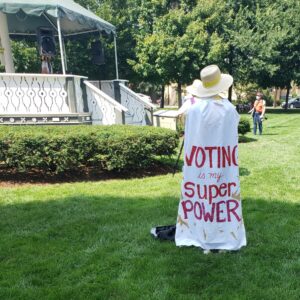
That is true. It was not a gift from the men who voted for the passage and ratification of the 19th Amendment in 1919 and 1920. But it was a gift to me and to you from those suffragists. Here is how Senator Kamala Harris expressed it two weeks ago, “I am so proud to stand with you. And I do so mindful of all the heroic and ambitious women before me, whose sacrifice, determination, and resilience makes my presence here today even possible.”
Cherish this gift to you from the women who worked so you would have it. Vote in the primary on September 1st. Be at the fall town meeting on October 17. Vote in the November 3 election. Vote every time you are given the chance. Your vote IS your voice. Voting is our Super Power. (Pull out the Voting is My Super Power cape.)
Madonna McKenzie was the first woman to serve two terms as a member of the Board of Selectmen, from 1992 through 1998, and in 1994 was the first woman elected to be its chair. Before that, she served two terms on the School Committee. She has served on numerous other town boards, including, but not limited to, the Water Bylaw Review Committee, Town Management Study Committee, and Sign Bylaw Review Committee. She has also served on the boards of the Westford Historical Society & Museum and of Community Teamwork. From December 1998 through September 1999, Madonna served as Westford’s interim Town Manager, then went on to be the Town Administrator in Carlisle and Dunstable’s first Town Administrator. Madonna is also a long-time member of the League of Women Voters
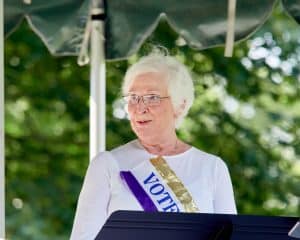
Good afternoon. I want to thank all of you for helping us commemorate the 100th Anniversary of the 19th Amendment giving women the right to vote. It is also important we remember that many Native American, African American, Asian American, and Latina women remained disenfranchised until the Voting Rights Act was passed in 1965. Since that time, the voting process has continued to be threatened in various ways, including this current year. The right to vote was won, but the battle to make sure it stays an accessible RIGHT still needs constant vigilance.
We owe the women who worked so hard and endured so many hardships our gratitude and thanks for getting us the vote. We also owe the women in Westford who forged the way for those of us who followed. I do not believe I would have been able to accomplish my board memberships and especially my election to the Board of Selectmen had it not been for Ellen Harde, the first woman elected to the Board of Selectmen, and her continued work for the improvement of our community. Her many accomplishments for the Town earned the respect of all. Her efforts made it easier for the women who followed to be accepted and supported. In my opinion it was Ellen Harde who broke the glass ceiling, I just climbed through the hole and I am sure you will agree. I am not sure a glass ceiling is ever shattered by one woman, rather the hole continues to be made larger and larger until it’s forgotten that there ever was a glass ceiling.
Like Ellen, I am also a blow-in arriving in New England in 1969 and settling in Westford in 1973. Here I first learned about the Town Meeting form of government. Most of the rest of the United States does not have this system and does not get an active voice in how their tax dollars are spent in their communities and cities. The concept of “Your Vote Your Voice” became very real to me. I became more involved in how our Town government works.
When I ran for the Board of Selectmen, I had already served six years on the School Committee. There were several reasons I decided to put my name out there for election. The Town was coping with recovery from budget slashes due to reduced state funds that occurred in the middle of the last budget year. All departments in the town had worked to make the necessary reductions, including 0% pay raises in contract negotiations. It was also when we were beginning the transition to a Town Manager Form of Government. This included changing several elected positions to Town Manager appointed positions. I hoped to help with both issues.
I ran for Board of Selectmen in 1992 against six men. Very much to my surprise, I received the most votes and was elected along with Jack Wrobel, who was a close second. In 1994 I was elected Chairperson. At that time, the then Board of Selectmen seemed to take turns as Chair. It was my turn and I let my fellow members know I was interested. In 1995 I was elected for a second term to the Board. Thanks to those who came before me, I did not have difficulties as a board member. I was, however, a single opposition vote on numerous occasions.
I encourage all of you who have contemplated running for an elected office to go forward. If I could make it, you can. There was nothing special about me, I just worked hard, did my homework, listened to what people had to say (even those I did not agree with because they often had a point of information that needed to be considered), and then made the best decisions I could for the Town.
Thank you.
Andrea Peraner-Sweet has been a member of the Select Board since 2010 and is currently its chair. In more than 25 years serving the town, she’s been a member of, among others, the Community Preservation Committee, Master Plan Committee, Permanent School Building Committee, Stepinski Land Acquisition Committee, Budget Solution Task Force, and Affordable Housing Committee, and served 13 years as a member of the Planning Board, many as chair or vice-chair. She is currently president of the Westford Land Preservation Foundation as well as a member of the Affordable Housing Trust Committee, and is a member of the League of Women Voters. In addition to all that, Andrea is a partner in the law firm of Fitch Law Partners in Boston and in 2015 was named one of the top women lawyers in Massachusetts.
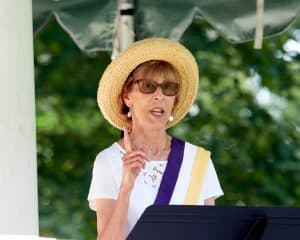
Thank you Madonna. And thank you to the Westford Historical Society and Museum, the Westford League of Women Voters, and the Westford Cultural Council for organizing this Women’s Suffrage Victory Rally and Promenade.
One hundred years ago, women won the right to vote. But, I think it is important to remember, despite winning that right, not all women were permitted to vote. Many women of color continued to be prevented from casting their ballots because of poll taxes, literacy tests, overt racism, and intimidation. It was not until the 1965 Voting Rights Act that black Americans were guaranteed the right to vote. Likewise, Native Americans were not permitted to vote. In fact, Native Americans were not even considered citizens of the United States until 1924 with the passage of the Snyder Act. And it took another 40 years for all 50 states to grant them the right to vote. So, I think it is important to remember as we celebrate today 100 years of suffrage, not all women won the right to vote back in 1920.
But, today, here in Westford, as you have listened to Ellen Harde, Madonna McKenzie and now me, what I want also to celebrate and acknowledge is that this year, 2020, 100 years after women won the right to vote, Westford elected its first person of color to the Select Board—a woman no less—Anita Tonakharn-Ngyuen. How grand is that!
I never thought I would run for elected office or for that matter, be elected, if I were to run. But, in 1993, I was angry. A large corporate entity wanted to move into our Town and thought it could bully its way in, ignore our zoning by-laws, our Planning Board, our Conservation Commission and their rules and regulations. As I followed what was happening, I complained on a weekly basis to my husband. And, finally, my astute husband, tired of listening to me, said, “well, then, stop complaining to me and do something about it.” What a novel idea.
So, the next week, I walked into a meeting of the “Stop Walmart” committee that had been formed. I knew no one; and quite frankly, other than going to Town Meeting, I hadn’t been involved in Town affairs or government. But, I walked in, introduced myself, and said, “I’m here to help.” And, of course, you all know what happened; Westford sent the Walmart corporate bigwigs and their attorneys packing.
I stayed involved in Town government by becoming a member of the Master Plan Committee. And, in 1997, when there was an opening on the Planning Board, friends—women who I had met on both the Stop Walmart Committee and the Master Plan Committee said you need to run for Planning Board. My initial response—I can’t—I don’t know anything about Planning. That did not seem to discourage my friends who organized to take out nomination papers on my behalf and before I knew it, there was a campaign committee in place for my election. And, I won.
I served on the PB for 13 years. And, I have now served on the Select Board for 10 years. Select Board. In 2019, at the League of Women’s Candidate’s night, I was asked—would I support a change in the name of the Board of Selectmen to the Select Board? My two-word answer—probably the shortest answer ever given to a question asked at Candidate’s Night—“yes, absolutely.” And, I pledged that night to do what was necessary to make that change happen. I made sure that a warrant article proposing this change was on the Fall 2019 Town Meeting warrant. And, at that Town Meeting, Town Meeting passed the warrant article that changed the name of the BOS to SB together along with changes to the language of the Town’s charter to ensure that it was gender-inclusive. Now, ten months later, we continue to await approval from the Massachusetts legislature for the change to be “official.”
Throughout my tenure as an elected official, and as members of the myriad of committees I have served on, I have always had one goal: to strive to bring people together to reach solutions—to foster an environment where all voices are heard, where there is an open and frank exchange of ideas, where people with differing views and opinions come together to explore new and creative solutions to problems. In 1999, I began as Chair of the Stony Brook Master Plan, an 18-month, at times contentious process, that brought together various and conflicting stakeholders—schools, water, conservation, affordable housing, recreation, ultimately leading to the creation of Veteran’s Memorial Park where today you will find the Stony Brook Middle School, the William Coakley Housing development, and tennis courts while protecting our water acquifer.
In 2003, I co-chaired the Stepinski Land Acquisition Committee, resulting in the purchase of 106 acres of open space, divided up between the Water Department, Conservation Commission and the Parks and Recreation Department.
In 2010, when the Town was facing serious fiscal concerns and a looming budgetary deficit, I chaired the Budget Solutions Task Force, once again bringing all of the Town’s stakeholders together to develop solutions to our budgetary problems.
What do all of these accomplishments have in common and what am I most proud of—they represent people coming together to reach creative, co-operative, compromised solutions, all of which have stood the test of time.
What started out of anger has turned into a 20 plus year commitment to this Town. To serving it; to helping it to be the best possible Town it can be; to creating a welcoming, nourishing, dynamic, diverse community.
So, as I stand here today, as I think about the future, I want to leave you with two thoughts: First, to all women, to all young girls, to those of you who don’t think you can effectuate change; to those of you who think your voices don’t matter; to the young girls in the classroom who may not raise their hand because they are afraid to speak; to those of you who are afraid to volunteer for a committee or run for office because you don’t think you can do it or because you don’t think you are qualified (and by the way, that never stops a man); to women of all ages, of all colors, of all nationalities, I repeat to you Susan B. Anthony’s words of more than one hundred years ago:
“Forget conventionalism; forget what the world thinks of you stepping out of your place; think your best thoughts, speak your best words, work your best works, looking to your own conscience for approval.”
And, secondly, and most importantly, our predecessors did not fight for the right to vote for 70 years for us not to use it—as Representative John Lewis’s Deputy Chief of Staff implored us all in the concluding words of her elegant eulogy of Representative Lewis: “if you are of age and eligible, for the love of God, VOTE!”
Thank you.
And now, it is my pleasure to introduce Laura Dickey.
Laura Dickey is currently spokesperson for the League of Women Voters Steering Committee. She has been a member of the League for 15 years, has been involved with numerous voter service initiatives including candidates’ forums, town meeting previews and mock elections. She has held the positions of secretary, webmaster, and newsletter editor, and served as League president for 4 years.
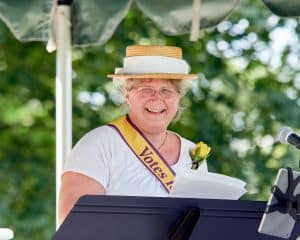
The battle for women’s suffrage had been hard fought. Rallies, parades, silent protests, and a nationwide campaign to sway both women and men to the cause had been an exhausting fight. However, by February 1920, the movement to get the 19th amendment passed was gaining momentum. Twenty-seven of the 36 states needed had ratified the amendment – including Massachusetts. As the number of states ratifying the amendment grew, you might think that the leaders of the suffrage movement would have wanted to take a break, come home to their families, and congratulate themselves on a job well done.
This is not what they did. On February 14, 1920, six months before the eventual ratification of the 19th amendment, Carrie Chapman Catt called for the creation of the League of Women Voters to “finish the fight”. This new organization would provide the support and education needed for 20 million newly enfranchised women to become active and informed voters. It would also give them tools to help shape public policy. The first president of the League was Maude Wood Park, a Massachusetts native whose enthusiasm for legislative work had helped turn the tide of support for suffrage in her home state.
The path to full suffrage has not always been smooth – the initial suffrage amendment did not include full voting rights for women of color, even though many had worked tirelessly for the movement. It wasn’t until the Voting Rights Act of 1965 was passed that all Americans were able to fully participate in democracy, although the fight to ensure and maintain voting rights for all Americans continues today.
The League of Women Voters was founded as a political organization because it wanted to advocate for issues. At first it focused on issues important to women, but soon expanded the scope. However, there was a very conscious decision to be non-partisan, and never support a party or candidate, something that has remained true to this day. This did not apply to its members, though. League members were encouraged to run for office and be active in whichever political party they preferred.
The League was modeled after our own system of government, with a central, national leadership, state Leagues, and the heart of the organization, the local Leagues. The Massachusetts state League was started only a few months after the national League, and our own Westford League was officially recognized over 50 years ago in 1968. At the local level, the League works to educate voters, study policy issues, and take positions based on those studies. It is a
truly grass roots effort that ensures the League reflects the voice of all of its members.
The local Westford League has held voter registration drives, forums on local issues such as affordable housing and opioid abuse, and has hosted Candidates’ Night for our local elections since 1970. Before the days of cable TV and streaming meetings on YouTube, Westford League members attended town committee meetings and acted as an Observer Corps, reporting on the substance of the meetings. We have helped to organize mock elections in the elementary and middle schools, worked with Girl Scout troops, and spoken with school organizations to get the next generation of voters excited and engaged in the political process.
As we have heard today, 121 Westford women registered to vote two days after the 19th amendment had been ratified. Today, of the 242 elected and appointed Westford town officials, almost half are women. Recently, increased engagement with politics and policies has led to more voters being aware of what League does in Westford and beyond. This new energy and interest will propel the Westford League into the next 100 years.
Like the original founders of the League, we cannot slow down or congratulate ourselves for past accomplishments. We must join the state and national Leagues to help fight climate change, ensure that all Americans have access to affordable health care, and most importantly right now, ensure that all eligible voters have their voice heard. Do you have a neighbor who is new to Westford? Help them make sure they registered to vote, and tell them about Town Meeting! Are you about to turn 18? Make sure you’re registered to vote and tell your friends to register too! Interested in learning more about town government and policies? Apply to fill a vacancy on one of our 60 town boards and committees, or run for local office. And don’t forget to vote! Early voting will continue this week Mon through Thu from 8am to 4pm and Fri. 8am to noon in the former Fire Station right over there. The deadline to apply for mail-in ballots is this coming Wednesday. You can deposit the mail-in ballots in the drop box behind Town Hall and the polls will be open for in-person voting on Tuesday, Sept. 1 from 7am to 8pm. And, anyone who wants to register to vote can do it at our table on the Common–we’ll have forms.
There are so many ways to have your voice heard, and no better time to start than today.
Emily Teller has lived in Westford for 37 years. She has served on the Roudenbush Committee, Drew Farms Task Force, League of Women Voters Board,and has been a poll worker for many years, She is a founding board member of the Parish Center for the Arts, and worked on the Stop Wal-Mart campaign, She helped fund the “Texas Road Neighborhood” side of the Common’s Bandstand, She is also one of 2 Westford board members of the Friends of the Bruce Freeman Rail Trail AND she is the “Executive Director” for the “Forward into Light” Right to Vote Centennial Commemorative lighting of the Westford Common and surrounding building that will take place every night this week.
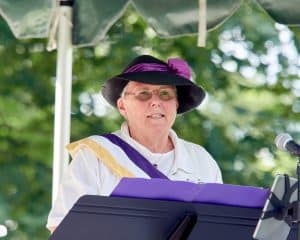
I am here today to talk about the “extended” part of this commemoration!
This Wednesday, August 26, 1920 marks exactly 100 years since the 19th Amendment became fully certified into the U.S. Constitution, effecting the single largest expansion of voting rights in our nation’s history.
Susan Combs, Chair of the Women’s Suffrage Centennial Commission and former Assistant Secretary at the Department of the Interior, wrote:
“On August 26…we will honor the courageous suffragists who fought for women’s right to vote. During this movement, these women marched, lobbied, picketed, and faced imprisonment in order to expand our democracy, and it is our duty to remember them. Together, we will share the suffragists’ message of hope, persistence, and resilience with the American people, and ensure that the legacy of these trailblazing women is celebrated.”
Beginning tonight and going through Thursday night, Westford Common and the 6 public buildings surrounding it will be lit up in the colors of the American Right to Vote movement:Purple and gold.
Westford thus partners with other cities and towns around the United States, including Boston, which will have hundreds of buildings, monuments and landmarks lit with the same colors!
Some of the more well-known of these are:
Boston’s Zakim and Tobin Bridges
50 National Parks, including Bunker Hill Monument and Lowell National Historic Park
The Golden Gate Bridge
Niagara Falls
The White House
The Smithsonian Institution
The National Archives Building
The Kennedy Center
One World Trade Center
I would also like to share that, despite its language, some women were not enfranchised by the 19th Amendment, even though many of them struggled and supported the Right to Vote movement long before and long after 1920. Native Americans and Chinese Americans were not considered citizens at this time, and they could not vote until the 1940s. Black women and other women of color did not receive guaranteed voting until the passage of the Voting Rights Act of 1965, and in some of our states they have still been denied this right.
I’m 71 years old – but have become fairly fluent on InstaGram – where I first read of this nationwide project several weeks ago!! I had no idea how many people and organizations in Westford would be involved and supportive, and how many I want to recognize and thank.
I did know of Westford’s 10-year tradition of lighting our Common and buildings in purple for “Take Back the Night” a program started by Jodi Marchand’s Foundation “Live for Liv” in honor and memory of her daughter, Olivia, to build awareness of domestic violence, and support victims of that.
I knew I would need a permit to use the Common, Andrea Parener-Sweet, Jodi Ross and Samantha Gray facilitated that process.
The Westford Historical Society, so ably and enthusiastically led by Linda Greene, partnered with my permit request.
After the Select Board gave my permit “the Green Light” so to speak, I called Jodi Marchand to ask if she would please give me the name of the lighting person who made “Take Back the Night” happen, and she did.
His name is John Hooper, and he was so enthusiastic and positive, “Sure I can do that – I know the Westford Common well!!”He delayed the installation one day, due to weather; however, on Sunday, he worked around the rain that stayed away during the Rally and Promenade, but came as soon as he began his lighting installation – along with lightning and thunder until he finished at 8 pm.
Westford Parks and Recreation and Highway work crews – they have spent every day this week working on the Common – they have manicured it – and reinstalled the Bandstand roof!!
The 6 building “permissions” came from:
The Friends of the JV Fletcher Library,
The Prudential Committee of First Parish Church United,
The Board of Directors of the Parish Center for the Arts,
Westford Fire Chief Joe Targ
Westford Police Chief Tom McEnaney.
Generous financial help was given by
the League of Women Voters of Westford.
the Westford Historical Society
and some very generous friends.
It truly does take a large chunk of this wonderful New England Town to make someone’s dream and vision come true!
Thank you all very much! and remember what it took to give women the vote and HONOR that by VOTING!!
Anita Tonakarn-Nguyen was elected to the Select Board in June 2020. As chair of the Westford Cultural Council she’s been instrumental in planning the events, including this one, that make up the year-long Westford Celebrates Women’s Right to Vote series. She’s secretary of the town’s Commission on Disability and on the board of directors of Freedom’s Way National Heritage Area. She’s a former member of the League of Women Voters Steering Committee and a former member of the board of directors at Westford Preschool at St. Mark’s.
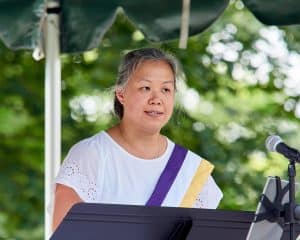
Thank you, Emily! And thank you to Linda Greene with the Museum and Historical Society, for really spearheading today’s event along with the League of Women Voters and the Cultural Council.
You know, if you asked me just five years ago if I’d ever run for local office, I’d look at you like you were crazy, and then ask, “Why? Do you think I could do it?”
Because all it takes is one person who believes in you.
The driving force in my decision to run for Select Board came down to someone, another woman, believing in me. Then it was another woman who offered to Chair my campaign. Then it was another woman who began emailing and calling people to tell them about me. It was a woman who first posted my yard signs around town while I was away caring for my mother in hospice.
It was women who lifted me through what felt like the longest campaign season during a global pandemic and the loss of my mother. It’s women who carried me to victory and women who continue to push me now that I’m in office. It’s women who advise me, and women who offer a listening ear.
The women’s right to vote, is more than just casting a ballot. To me, it’s the entire force of women that comes behind that ballot.
The Cambodian- American human rights activist, Loung Ung, said, “Voting is not only our right, it is our power. When we vote, we take back our power to choose, to speak up, and to stand with those who support us and each other.”
When you cast your votes for the September and November elections, I hope you’ll think of your power behind that vote.
So, now as a newly elected woman of color on the Westford Select Board, I’m honored to read for you the 19th Amendment of the Constitution of the United States of America:
“The right of citizens of the United States to vote shall not be denied or abridged by the United States or by any State on account of sex. Congress shall have power to enforce this article by appropriate legislation.”
And it’s with those two simple sentences, women won their right to vote.
Thank you!
“Forward through the Darkness, Forward into Light.”
The Illumination of the Westford Town Common and Public Building in Suffrage Colors
August 23-27, 2020
Illumination lighting is sponsor by: The Westford Historical Society, the League of Women Voters of Westford and friends of “Forward through the Darkness, Forward into Light.” campaign.
